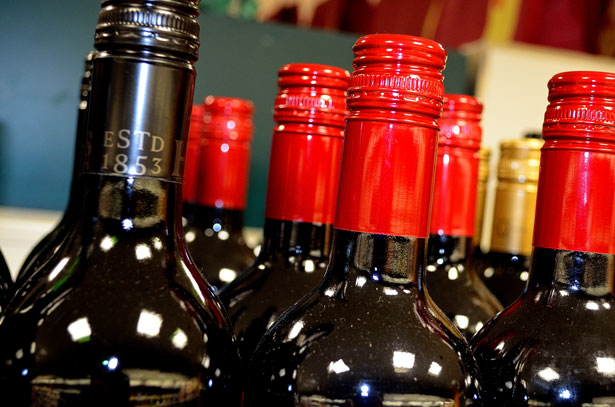
We all have fanboy moments, geek-outs, obsessions. I sure do.
We identify ourselves vis a vis our preferences and interests. This strikes me as normal and healthy. It starts early, when as kids we swear allegiance to either chocolate or vanilla, and it goes on from there: consider Trekkies, (who get picked on more than is probably necessary) or model train collectors (who wish they’d get picked on more.) There are cupcake fanatics and Twilight fans and many millions of quilt geeks out there, with whom I proudly stand. Even choosing not to be a fan of anything is an identity choice; the antifan, the independent — this is a (paradoxically) popular option. It’s human to seek our bliss, whatever it is, and as long as no one is doing harm, I support bliss-finding of all kinds.
But let us linger on that “doing harm” part.
While I was sewing the other night, I watched a documentary about sommeliers. Somm, made in 2012 by director Jason Wise, followed four American males over the course of a year as they studied and then sat for the Master Sommelier exam.
The Master Sommelier exam is “an almost impossible to pass” test administered once a year by the Court of Master Sommeliers. There are three parts to the test, all more torturous than the next: there’s the theory part, where the subject must be able to do something outrageous, like correctly predict the temperature on a typical day in May in some ancient Mediterranean terroir; there’s the blind tasting, where the quaking, shaking young man or woman must suck down multiple mystery wines and accurately answer what they are and where they’ve come from, down to the vintner and the year; and then there’s the service portion of the test, where these pour (sorry) souls must execute pitch-perfect wine service to people who aren’t real customers, but the members of “the Court” who are actively trying to make them fail.
The exam is an exercise in absurdity. Only 135 people in 36 years have passed this course.
The four guys followed in the film were open and honest about how studying for the test had all but ruined their respective relationships — and their girlfriends concurred. The test created tension between the friends, took its toll on their bodies (no sleep, lots of wine, mega-anxiety) and though it wasn’t a major focus of the film, I can only imagine the economic impact of the experience on a Masters-bound somm. Most take off work to study full-time, and to try all these fancy wines one must eventually purchase them, I assume? And the Knights of the Court of the Round Table of Master Sommeliers of Camelot’s Men don’t administer the test for free, naturally: it’s $325 to register, and you have to get to the city where it’s held, find someplace to stay, and you’d better be rocking a killer suit when you show up all shaved, haircutted, two-bitted, etc.
I was more than a little grossed out by all this.
Though it cannot be denied that fine winemaking — “vinification” if you’re nasty — requires skill, craftsmanship, innovation, and a hell of a lot of work, at the end of the day, you’re gonna pee this stuff out. I apologize for being crass, but this is the reality of any beverage. Does good wine taste delicious? Oh, yes. Does it make you want to sing and make art? Totally. If you choose the right bottle on a date, are you going to impress the waiter and up your chances of getting lucky? You just might, Johnny. And these are all good things that you can’t get from ordering a Coke.
I also want to give props to people who know wine. Full disclosure: I dated a sommelier last summer. He has risen through the ranks of the Chicago restaurant scene, he’s extremely skilled in his job and he’s passionate. That’s cool; he’s not the problem.
It was the level of obsession and elitism on display in Somm that made me want to order a Mr. Pibb in pure defiance of a world that creates such monsters. I would’ve ordered a damned Diet Rite if I could’ve, and popped the lid with a flourish reserved for a pricey sauterne. When I watched one of the guys say, in a kind of trance, speaking-in-tongues state over a glass of white, “This wine is bright, this wine is clear, this wine is from the Loire Valley; this wine is medium body, this wine has vanilla notes, this wine…this wine is freshly-cut garden hose,” I stopped stitching at my sewing machine, hollered, “Oh for GOD’S SAKE!” and threw my half-square triangle in the general direction of the screen.
The Master Sommelier Exam prides itself on being exclusive, but they’ve landed backward: these folks have shut mere mortals out so completely, they’ve made us the enviable ones: we can still enjoy glasses of wine; they can’t. We can still get excited about a $30 bottle that we won’t describe much better than “really good” and we can move on after it’s poured to talk about other things that interest us, like…not wine. The tower they’ve built is all ivory, no stone. They can’t love the thing they love anymore because when you love something, you set it free.
(I don’t know how that works, either, but it was a perfect way to end that paragraph.)
Anything that can ripen can blight; everything, if conditions are right/wrong, can go septic. Find your bliss. But prune it.
